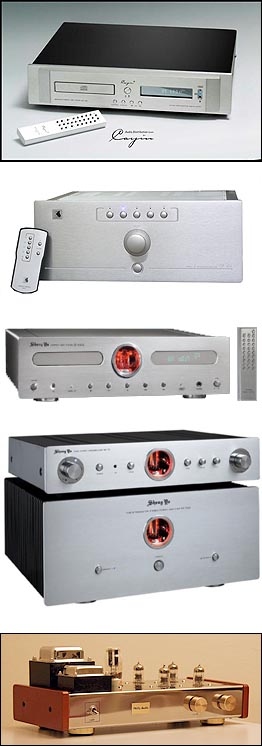 |
|
|
|
 |
|
|
 |
|
A recent predictive statistic claimed that a < 5% increase of living standards in China would wreck havoc with America's crude petroleum-based economy. If you imagine that vast nation -- a country whose border stretches over 22,000 kilometers on land and adds coast lines of 18,000 kilometers, with an urban population of 515 Million as far back as 1996 -- as transitioning from the bicycle to cars for its main means of transportation, this indeed seems a likely scenario. More incentive perhaps to accelerate Western research into hydrocells and hybrid automotive technologies? Ford Motor Company has announced its Escape small SUV as a 40+mpg hybrid gas/battery option for 2005.
|
|
 |
|
While we're still on the subject of SUVs, the Chevy TrailBlazer, GMC Envoy and Olds Bravada [above left to right] all share the same platform. Indeed, Saab's first SUV entry too will be based on it until the Scandinavian firm finishes their own from-the-ground-up effort for the following model year. According to a top salesman at Santa Fe's dealership, Chevy's new Malibu is an all-Saab crop bumper to bumper. Though working in an American dealership, this in-the-know fellow confided that he'd never buy an American car and indeed owns a beat-up Honda with 260,000 miles on it that just refuses to die (he does drive an American truck as well but that's not a car). He would buy the new Chevy Malibu, however - because it really is a rebadged Saab through and through. This gent then walked me to the new Aveo mini [far right]. "Check its parts-content-country-of-origin-sticker," he taunted. 90% Korea. Chevy needed an entry-level car with phenomenal fuel mileage and a starting sticker price of $9,995. Borrowing an existing Asian platform was cheaper and faster than relying on comprehensive in-house design.
Though German by birth, I do drive American, exclusively. Why? Because I live in TinyTown without any foreign car dealerships. My Chevy SUV and Olds tourer can get repaired at any old Mobile or Chevron service station, even in truly remote outposts should I get stranded somewhere obscure on the road. My dad in Germany drives Mazda. He's on his fourth one. He wouldn't be caught dead with a German vehicle. "The Japanese build the best cars, period" is his non-Hindu mantra. He claims that of all the makes sold in Teutonia last year, only Toyota and Mazda posted positive growth. I concur with his notion about who makes the best cars. But if I want guaranteed serviceability where I live, American is the way to go. My uncle on my father's side owns a law firm in the small German town of Neustadt an der Aisch outside of Bad Windsheim. He has to drive a big Merc. If he didn't (or an equivalent Audi or BMW), talk of his business faltering would send prospective clients to the competition. Perception rules not just in audio. So Daimler-Benz it is for uncle Bobby, bless his heart.
|
|
|
|
Which brings us back to that pesky word 'platform'. Automobile consumers are well aware that the global pie of car makers has been gobbled up by a few mega consortiums which, among each other, own 90% of all existing brands. Platform and parts sharing is so common that new legislature now mandates the previously mentioned parts-content sticker. A German car may prove to include parts from South America, Mexico and Poland. A Japanese car may use more German parts than Japanese. It's a sign of today's globalization times.
|
|
|
 |
|
In audio, China is the new land of opportunity. Makers like Antique Soundlab, Aurum Cantus, Bada, Cayin, East Sound, Hit Audio, Jolida, KorSun, MingDa, Neotech, Shanling, ShengYa, Vincent, Xiangsheng and Wan Lung all offer fully developed platforms which can be appropriated and rebadged by Western firms. In fact, some of these names already are sub-brands and built/designed by others. If there's one thing the Chinese are at a disadvantage about, it's experience. 40+ years of Western Hi-End has gone beyond textbook circuitry and into serious tweakland. That's why many Western firm are liable to modify Far-Eastern platforms by substituting parts or even altering circuitry, both for long-term reliability and sonic improvements. But it's fair to say that the current discrepancy of labor rates and environmental protection legislature, between the US and mainland China, means that in order to offer aggressively priced products that can compete with the Chinese direct imports, American makers are now forced to embrace Chinese platforms or at the very least incorporate partial outsourcing.
It seems autophiles are far less incensed about this accelerating globalization trend than certain audiophiles who sometimes adopt the mantle of private-eye gumshoe to determine what American brand or model is of Chinese origin only to cry foul and bloody murder when said maker didn't make a preemptive statement and is slapping on a hefty profit - as though audio was supposed to be a charity rather than profitable business. There'll always be American buyers for Korean Hyundai and Kia cars. They are affordable and even enjoy comprehensive dealer and service networks. There'll always be US buyers for Chinese audio brands who'll attempt to import them directly or via one solitary middleman without any additional infrastructure. It means taken a risk on resale value or even ability. It means taking a chance on service issues and associated downtime and shipping charges. All that for the initial savings. But there will also be those who don't begrudge an established US maker his profits if he, in turn, can provide better support and long-term protection for one's audio investment, especially considering our relentless habits of endless upgrades and audiogoN sales.
To merely write off a US brand or model as "minor parts and circuit changes of Chinese platforms that cost a mere fraction of it in China" overlooks that it is exactly such minor changes that support an entire after-market modification industry in American audio and spell the difference between a tweaked-to-the-hilt HiEnd machine and a mass-market equivalent. Generalized statements naturally always fall way short because they equalize the exceptions. Clearly, a decision over what constitutes fair business practice and what becomes a consumer rip off must be made on a case-by-case basis. Additionally, what constitutes a fair value will vary from consumer to consumer. We all have different criteria which motivate us to purchase one brand over another. |
|
|
|
 |
|
|
Today's column is really only intended to point at the existing parallels between automotive and audiophile business practices which operate as a function of a serious global imbalance between costs of living/manufacture and currency exchanges between East and West. The operative term is 'platform sharing'. You may not like it -- and in fact, economists must speculate about the nefarious long-term effects predicted by the wholesale migration of our domestic manufacturing base to elsewhere -- but such is living amidst 21st-century reality. Some wise man or woman once said that only fools find fault with reality. Learn the rules of engagement so you can play the reality game - but don't complain that things are the way they are.
In fact, even an "all-American" brand like Meadowlark Audio which takes open pride for relying on domestic hand labor and parts sourcing must obtain at least its drivers from Scandinavia. Brands like Adcom, Cambridge, Outlaw and Rotel couldn't even exist without close vendor relations with China and Taiwan. California Audio Labs operated a factory in Thailand. Most of CAL's former marketing and engineering staff has migrated to Adcom. Is that and what it likely signifies a bad thing? Not in my book. Ditto for Acoustic Energy, parts of the Von Schweikert Audio line or a host of other brands whose retail pricing structure is possible only because of foreign labor and exploded off-shore manufacturing scale.
Each time we buy anything, we vote with our wallets. We either support predominantly home-grown products and their makers or send our hard-earned money to China. With all the Chinese goods on our shelves (just think Wal-Mart for proper perspective), it begs the question what America produces besides lumber that China wants to buy from us? Therein lies an explosive scenario for economists who must surely foresee a grave trade deficit that's growing worse rather than better as time goes by... |
|
|
|
|
 |
|
 |
|
|
 |
|
|
|
|
|
|
|
|
|
|
|
|
|